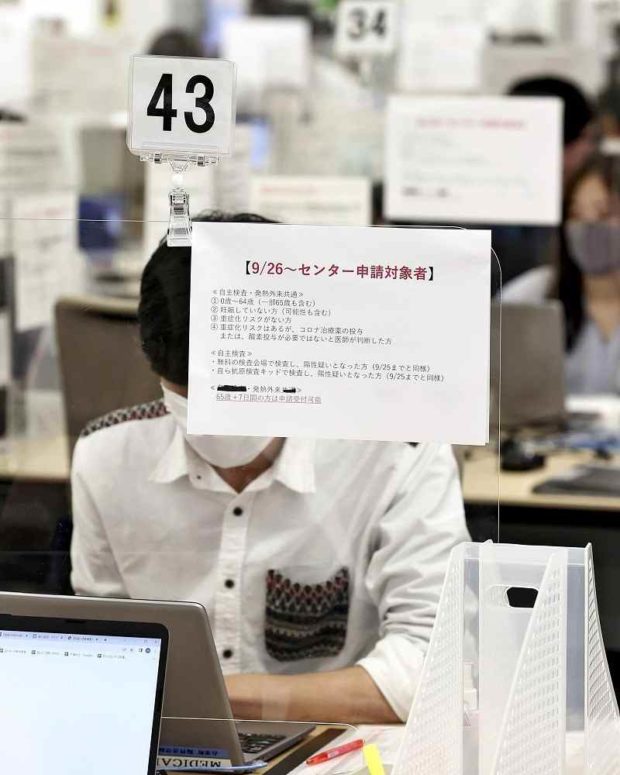Simplified pandemic reporting system begins in Japan

Personnel at the Tokyo metropolitan government’s coronavirus patient registration center log information about low-risk cases on Monday. The Japan News/Asia News Network
TOKYO — A system intended to reduce the administrative burden on medical institutions by limiting the reporting of coronavirus cases to the elderly and other patients at high risk of serious illness took effect nationwide Monday.
But according to a Yomiuri Shimbun survey, 11 prefectures will continue to collect relevant information and monitor the health of low-risk coronavirus patients who fall outside the scope of reporting under the simplified system, amid concerns about the risk of a sudden deterioration in the conditions of patients who are not subject to reports.
In the survey involving all 47 prefectures, nine said they had introduced the simplified reporting system before Monday, while Iwate, Saitama, Tokyo, Shiga, Nara, Wakayama, Tottori, Shimane, Tokushima, Saga and Oita said they would keep monitoring the conditions of low-risk patients on a daily basis.
About 100 officials were busy checking cases Monday at the Tokyo metropolitan government’s patient registration center, which is responsible for monitoring low-risk cases.
The metropolitan government is urging low-risk patients who test positive to register their details at the center so that people in need of help can receive support, such as food deliveries.
Article continues after this advertisementNurses check the information that has been logged on the centralized COVID-19 patient database, HER-SYS, and if any problems are identified, the patient’s condition is checked.
Article continues after this advertisementThe metropolitan government has asked doctors at facilities that treat outpatients who have a fever to hand out flyers with information about the center. “As the conditions of even young people can suddenly get worse, I hope as many patients as possible register their details with the center,” a metropolitan government official said.
Hokkaido is among the 36 prefectures that are not monitoring low-risk patients. Such patients in those prefectures are being advised to contact designated consultation centers only if their conditions deteriorate, in line with the notification issued by the Health, Labor and Welfare Ministry.
Hokkaido’s consultation center was bombarded with inquiries on Monday, including one from a patient whose symptoms had deteriorated. A team of 60 personnel including nurses work in shifts around the clock to handle consultations and connect patients to medical institutions.
An official at Kanagawa Prefecture’s medical crisis management headquarters said the move “is a first step toward treating [COVID-19] like a common disease.”
Medical institutions and public health centers have welcomed the decreased workload since the launch of the simplified reporting system.
Among seven fever patients who visited Otani Clinic in Toshima Ward, Tokyo, on Monday, only two were logged under the new reporting system. At the peak of the pandemic’s seventh wave, it took two hours to complete the registration of 20 cases handled at the clinic in one day. On Monday, it took only 10 minutes.
“The burden has certainly decreased,” said Yoshio Otani, the director of the clinic. But, “I’m concerned about possible delays in responding to patients who do not receive health observations if their condition suddenly gets worse,” added Otani, 58.
Local governments that introduced the system before Monday have already seen tangible results, with the number of reports down 80%-90%, drastically cutting the amount of administrative work.
In Ibaraki Prefecture, which started the new system on Sept. 2, the number of reports handled by its public health centers through Sept. 15 was down by 90%.
In a recent prefecture-wide survey, 60% of medical institutions said workloads had drastically decreased since the introduction of the system. However, 10% said workloads had increased because inquiries about recommended recuperation periods, among other issues, had increased.
RELATED STORIES
Japan: COVID-19 pandemic exacerbates decline in marriage
Japan’s COVID-19 herd immunity near 90% after Omicron wave–study
For more news about the novel coronavirus click here.
What you need to know about Coronavirus.
For more information on COVID-19, call the DOH Hotline: (02) 86517800 local 1149/1150.
The Inquirer Foundation supports our healthcare frontliners and is still accepting cash donations to be deposited at Banco de Oro (BDO) current account #007960018860 or donate through PayMaya using this link.